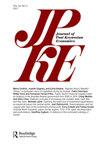发展中经济体和新兴经济体的气候变化和宏观经济政策空间
IF 1
3区 经济学
Q4 ECONOMICS
引用次数: 1
摘要
摘要本文论述了外围国家由于气候变化和对外融资依赖的双重影响而产生的宏观经济挑战。该论文使用后凯恩斯主义的资产自身回报率概念来评估对不稳定资本流动的综合影响的易感性以及对气候变化的物理和过渡风险的脆弱性如何减少宏观经济政策空间。据说,气候变化和缓解策略会导致金融不稳定,从而导致国际投资者转向优质投资者。这意味着商品依赖程度高的低收入国家的外部金融脆弱性更高,汇率波动和贬值压力加剧,从而影响到各国货币的流动性溢价和对短期汇率的预期。因此,受影响国家的决策者被迫承诺采取有利于投资者的政策和高利率,以维护其货币的接受度。因此,易受气候变化和缓解的物理风险的影响,助长了国际货币不对称和等级制度的自我延续性质。本文章由计算机程序翻译,如有差异,请以英文原文为准。
Climate change and macroeconomic policy space in developing and emerging economies
Abstract This paper addresses the macroeconomic challenges stemming from the double affectedness of climate change and dependence on external finance in peripheral countries. The paper uses the Post-Keynesian concept of an asset’s own rate of return to assess how susceptibility to the combined effects of erratic capital flows and the vulnerability vis-à-vis the physical and transitional risks of climate change reduces macroeconomic policy space. Climate change and mitigation strategies are said to contribute to financial instability ensuing flight-to-quality of international investors. This translates into higher external financial fragility in low income countries with a high degree of commodity dependence—with increased exchange rate volatility and devaluating pressure deteriorating affected countries’ currencies’ liquidity premia and the expectation of their short-term exchange rates as result. Consequently, policy-makers in affected countries are forced to commit to investor-friendly policies and high interest rates to uphold their currencies’ acceptance. The susceptibility to the physical risks of climate change and mitigation hence contributes to the self-perpetuating nature of international monetary asymmetries and hierarchies.
求助全文
通过发布文献求助,成功后即可免费获取论文全文。
去求助
来源期刊

Journal of Post Keynesian Economics
ECONOMICS-
CiteScore
1.70
自引率
10.00%
发文量
23
期刊介绍:
The Journal of Post Keynesian Economics is a scholarly journal of innovative theoretical and empirical work that sheds fresh light on contemporary economic problems. It is committed to the principle that cumulative development of economic theory is only possible when the theory is continuously subjected to scrutiny in terms of its ability both to explain the real world and to provide a reliable guide to public policy.
 求助内容:
求助内容: 应助结果提醒方式:
应助结果提醒方式:


